De Nederlandse schrijver, popjournalist en muzikant Nanne Tepper werd geboren in Hoogezand op 17 januari 1962. Zie ook alle tags voor Nanne Tepper op dit blog.
Uit: De lijfbard van Knut de verschrikkelijke
“En daarbij: ik weet dat ik stervende ben (wil ik hiermee zeggen dat ik mij tot de hemelse dwazen reken? welzekerl), mijn duizelingen overtreffen die van de man met de eeuwige kater, mijn dagen zijn geteld, niet zozeer ben ik murw gebeukt als wel tot op mijn ziel afgekloven, maar ik ben nog altijd schrijver, een mislukte voorlopig, maar een schrijver ben ik, en een van de voornaamste taken van schrijvers is, naast het voortbrengen van schoonheid om de mens te kalmeren, het uit de doeken doen van raadsels waarop enkel individuele antwoorden mogelijk zijn, om de mens te verontrusten, om zichzelf te ontlasten, om, kortom, toch nog iets met de hele kolerezooi aan te vangen, al was het maar om de moderne gedachte dat de fut uit de menselijke geest is te logenstraffen.
Nog één boek moet ik schrijven voor ik doodgeduizeld ben. Hierin zal ik mijn raadsel presenteren. Uiteraard heb ik al zeven jaar een titel in mijn hoofd: Waarheen, waarvoor en waarvandaan? Maar deze dekt geenszins de lading. In feite is er voor zo’n lading ook geen titel te bedenken; daarom heb ik de volgende verkozen: Howto cope after you’re dead.
Mijn eigen oude credo zeg ik nu vaarwel, hoezeer ik er ook aan verslingerd ben geraakt. Geen salvo’s meer uit mijn six-gun, losjes uit de heup, in het wil-de weg, niemand ontziend. De kruitdampen die voortaan van mijn bladzijden zullen slaan zijn afkomstig van zwavel en vuunNerk, van een incidentele onweersbui en soms, heel soms, van de klappertjes van mijn van de zolder gehaalde klappertjespistool. En mijn oude credo? Ach, u raadt het al, ’t was Fuck ’Em All!”

Nanne Tepper (17 januari 1962 – 10 november 2012)
De Amerikaanse schrijver David Ebershoff werd geboren op 17 januari 1969 in Pasadena, Californië. Zie ook alle tags voor David Ebershoff op dit blog.
Uit: Pasadena
“On a december morning in 1944, Mr. Andrew Jackson Blackwood—a young-faced, self-made man who had been in California twelve or fourteen years, depending on whom you asked—was making his way down El Camino Real. He was driving his yellow Imperial Victoria on his way to a real-estate convention in San Diego. At present he was somewhere between Dana Point and Oceanside, but many miles back his Automobile Club map had flown out the window, the wings of its paper-folds extending and flapping away. The fluttery movement—and the car’s sudden swerve as he lunged for the accordioned map—made him think of a large, ancient bird lifting itself into extinction. This was a more morose thought than Blackwood was used to, and it didn’t stay with him, flitting away like the map itself. But Blackwood had a sense of direction, he liked to tell himself, and he continued on his way.
Yet by now he could no longer be certain that he was still traveling down El Camino Real; had he made a wrong turn somewhere back? The road cut through dormant pea fields and lettuce farms and a patch of shallots, passing an avocado orchard and a lemon grove protected by eucalyptus windbreak. It climbed a scrub-oak terrain burned gold in autumn where at hillcrest a rattler stretched belly-up in the sun. Thin, shabby utility poles stood across the fields like a line outside a poorhouse, and upon the drooping wires sat a family of garbage-fed gulls. Every now and then the road turned sharply and the hammered pewter of the Pacific would appear in the distance and Blackwood would inhale, tasting the salt on the breeze. He was listening to the kid announcer on the KCRO radio news, and lately word from Europe was better than expected, the Americans marching swiftly up the wine-cold valleys of the Moselle. Blackwood thought of the boys weighted down by carbine and canteen, and it occurred to him just then, as he descended a hill and the ocean lay before him, that the war would end sooner than most dared to hope. The soldiers would return en masse and many would request passage to Long Beach or Coronado and each would need a bungalow and a patch of ryegrass for himself and his honey-haired girl.”
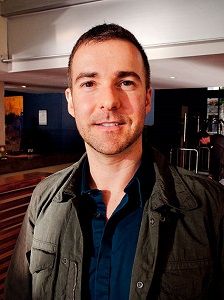
David Ebershoff (Pasadena, 17 januari 1969)
De Engelse schrijver Gavin Extence werd geboren op 17 januari 1982 in Swineshead, Lincolnshire. Zie ook alle tags voor Gavin Extence op dit blog.
Uit: The Mirror World Of Melody Black
“Simon’s flat was a mirror of ours. One bedroom, a shower room rather than a bathroom, and a kitchen-lounge-diner that a letting agent – in a couple of weeks’ time – would generously describe as open-plan. The central hallway was narrow and windowless, lit by a solitary uplighter which cast concentric pools of light and shadow over unadorned paint.
The lack of decoration was something I noticed straight away, in the several seconds in which I paused on the threshold. Beck and I had gone the other way in our flat. On our main lights we had those tiny imitation-glass chandeliers that you can pick up for ten pounds in any homeware store; and we had prints or photos on every available surface – landscapes and holiday shots – along with half a dozen mirrors of various shapes and sizes, to give the illusion of space. I’ve always believed that the way a person chooses to embellish his or her surroundings speaks volumes. My décor, for example, would tell you that I have a weakness for kitsch, tend to accumulate clutter, and dream of bigger things.
But what did Simon’s flat say about him? On the face of it, nothing at all. It just added to the mystery. Peering into that hallway, there was not a single totem of personality to be seen. Nothing to fill in the poorly drawn impression I had of the man.
In all honesty, I’m not even sure you could call what I had an impression. It was probably more fantasy than reality, the sort of half-baked fiction we tell ourselves to flesh out the bit-players in our daily soap opera. As far as facts went, I could have written everything I knew about Simon on a Post-it note. He was fortysomething, lived alone, was well groomed, impeccably polite (in an arm’s-length sort of way), didn’t pronounce his aitches, and had a job that required him to wear a shirt, and sometimes a suit jacket, but not a tie. I’d never been interested enough to find out what that job might be.“

Gavin Extence (Swineshead, 17 januari 1982)
De Deense schrijver Ib Michael (eig. Ib Michael Rasmussen) werd geboren op 17 januari 1945 in Roskilde. Zie ook alle tags voor Ib Michael op dit blog.
Uit: The Pope Of the Indies (Vertaald door Ingrid G. Lansford Gyldendal)
“I could see that he was at death’s door. And soon after, when someone handed me the papers to be registered, I could not keep from skimming through them.
It appeared that this man, who called himself Poma de Ayala, had written a chronicle that included all the early knowledge. Here was nothing less than the first complete report written by a native of the new world.
It further appeared that he belonged to the dynasty of the last Incas, which the name certificate from the period of our previous notary’s confirmed. In other words, I had no reason to doubt that the man was who he gave himself out to be.
The next time I looked up, he had already been dealt with at the counter and sent the way most are sent: simply out the door without having accomplished anything whatsoever.
I lifted my finger, but it was too late. The doors to etemity’s antechamber were closing after him. He closed them so quietly that I remember thinking, why doesn’t anyone ever slam them so it can be heard under the stone vault?
For a moment I sat there numbed by the thought that a primary historical source had walked off right under my nose. Then I ignored the undersecretary’s protests, jumped up and ran out in the street to stop him.
But he had disappeared in the crowd. When I came in again, I scowled at the undersecretary. What sort of Christian was he to deny a dying Indian some water? I went back to my desk, determined to track the Indian down before it was too late.”
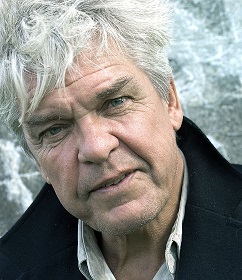
Ib Michael (Roskilde, 17 januari 1945)
De Nederlandse schrijver en schilder Anton Valens werd geboren op 17 januari 1964 in Paterswolde. Zie ook alle tags voor Anton Valens op dit blog.
Uit: Het Boek Ont
“Dat betekende dat hij gespannen was. Dat wisten alle aanwezigen. aanwezigen. Jean-Luc was altijd gespannen en wipte dan met zijn benen. Hij was moe, voelde zich futloos en onrustig tegelijk, legde hij uit met zuidelijke tongval. Hij was opgegroeid in de omgeving van Weert, verdwaald en in Groningen verzeild geraakt. Hij was klein van gestalte en leek wat op een vosje, een zorgelijk, rossig, kortharig vosje met lichtblauwe, schuwe ogen. Zijn algemene indruk was: iemands jongere broertje.
‘Hoe staat het met je post?’
‘De maandspecificatie van de SD, een paar aanmaningen en iets van een deurwaarder of zoiets. “ONMIDDELLIJK OPENMAKEN” staat op de envelop.’
‘Wat je niet hebt gedaan.’
‘Daarvoor zit ik bij Man&Post,’ verdedigde Jean-Luc zich plotseling fel. Zijn zwakke punt was, naar eigen zeggen, zijn ‘onverschilligheid’: ‘Als ik ergens geen zin in heb, word ik onverschillig.’
Isebrand wilde ervoor waken Jean-Luc als deelnemer te verliezen, want hij achtte hem een lid bij wie veel winst te boeken viel, en daarom bracht hij de jongen weer tot kalmte en dempte diens agressieve opwellingen door hardop te hopen: ‘Misschien dat het openen van je postje rustiger maakt.’
Jean-Luc knikte, maar weinig overtuigd. Isebrand keek hem nog een paar tellen indringend aan en schoof toen door naar zijn buurman, nog een uitkeringstrekker, maar ‘thuiswonend’, in de betekenis van ‘bij moeder’.
‘Boudewijn, hallo, goed je te zien. Hoe zitjij erbij vanavond?’
‘Als een zak rotte aardappelen.’
‘Dat is niet zo bien, mien jong.’
De zwartharige Boudewijn van Velzen keek het ene moment als een geslagen hond, om dan plotseling stompzinnig te grijnzen. Hij had zijn baard afgeschoren (‘het werd me te warm’) maar een pluk haar gespaard in de hoek waar de hals in de kin overgaat, als een te ver naar achteren geplaatste sik. Isebrand kon geen hoogte van deze gast krijgen. Hij verscheen nu eens wel, en dan weer niet.”
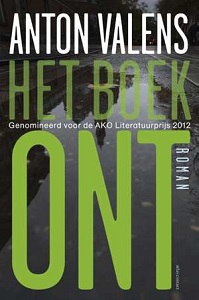
Anton Valens (Paterswolde, 17 januari 1964)
Cover
De Zweedse dichter, schrijver en regisseur Lukas Moodysson werd geboren op 17 januari 1969 in Malmö. Zie ook alle tags voor Lukas Moodysson op dit blog.
Uit: Show Me Love (Fucking Åmål)
“Karin stands outside the door and begs to her daughter. She feels like being the most unsuccessful parent in the world.
KARIN
Agnes…? I know I’ve made a mistake. But you must understand that it’s not always so easy to be a parent. It’s so often – one don’t know what to do, what to say, how to behave. There’s nohandbook. Especially not when you’ve got such a… special child as you.
Oskar looks out from his room som metres away and wonders what mum is doing.
KARIN
I didn’t to it to be mean. I did it because I was worried about you.
And because I was envious of that it’s always dad your talkingwith. You never talk with me. Either when you’re happy or sad.Why don’t you? Do you hate me so much?
Inside the room, that we don’t see but hear, Agnes puts on a record on a high volume, something hardcore-ish. She turns up the volume even more. The music is so strong that the door vibrates. Karin becomes furious.
KARIN
Open the door! Agnes! Open the door!
Olof comes forward to her, puts an arm around her shoulders, calms her down. Karin starts to cry in Olof’s embrace.”
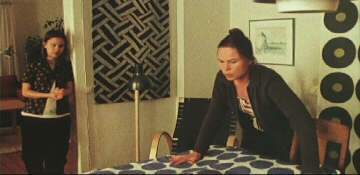
Lukas Moodysson (Malmö, 17 januari 1969)
Agnes en moeder Karin in de film Fucking Åmål van Moodysson uit 1998
De Oostenrijkse dichter en schrijver Raoul Schrott werd op 17 januari 1964 geboren in Landeck, Tirol (en volgens andere bronnen op een schip „São Paulo“ dat van Brazilië onderweg was naar Europa). Zie ook alle tags voor Raoul Schrott op dit blog.
Uit: Handbuch der Wolkenputzerei
„Der Rückzug in die Illegalität des Privaten war offensichtlich. Armenier und Türken, denen er zum Eigengebrauch erlaubt war, lieferten selbstgebrauten Wein frei Haus; in großem Kreis wurden Partys gefeiert; der Schwarzmarkt führte von unzensierten Videos bis zu Medikamenten alles, und im Untergrund gab es billiges Opium, Prostituiertenviertel und Schwulenparks. Das Regime reagiert darauf, indem es Exempel statuiert, drakonisch, einzeln und willkürlich. Sich auf offene Konfrontationen einzulassen, dazu schien sein Rückhalt in der Bevölkerung längst zu gering; ein gewonnenes oder verlorenes Fußballspiel bot Anlaß genug, um diesen Anschein einer Ordnung für ein paar Stunden auf der Straße außer Kraft zu setzen. Wenn darin ein offenes Aufbegehren lag, dann nur aus einem Bedürfnis nach Normalität; von Revolutionen hatte man genug. Worin aber diese Normalität bestehen könnte, blieb fraglich.
Man versteht ein Land entweder in sieben Tagen oder in sieben Jahren; dennoch aber blieben die Bilder des Iran, die wir bekamen, so unterschiedlich wie widersprüchlich, und es gab so viele davon, wie es in einer Gasse des Teheraner Bazars Spiegel gab. Der Westen kannte nur zwei davon. Persien, das war der alte Orient der Touristen, die Teppiche, Wasserpfeifen, Rosen, Nachtigallen und Lustgärten; der Iran jedoch Turban und Tschador, Fanatiker und Terroristen: moderne mediale Illustrationen für jene hic dracones, ibi sirenes, die man immer schon an den Rand der uns bekannten Welt gesetzt hatte und die nur Stereotype der Ignoranz darstellten. Auch was wir von ihnen wußten, war wenig; sie von uns aber genug, um dies zu begreifen. Dafür aber hatte Kultur, abseits von den üblichen Stehempfängen und irgendwelchen Schriftstellerkolloquien, hier für einmal auch eine unzweifelhafte Funktion, nämlich die Klischees auf beiden Seiten offenzulegen, bloßzustellen und auszuräumen, um die Grundlagen eines Dialogs zu schaffen, den die Politik dann vielleicht aufzugreifen imstande wäre.“
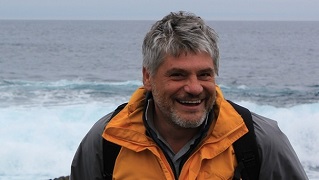
Raoul Schrott (Landeck, 17 januari 1964)
Zie voor nog meer schrijvers van de 17e januari ook mijn vorige twee blogs van vandaag.
